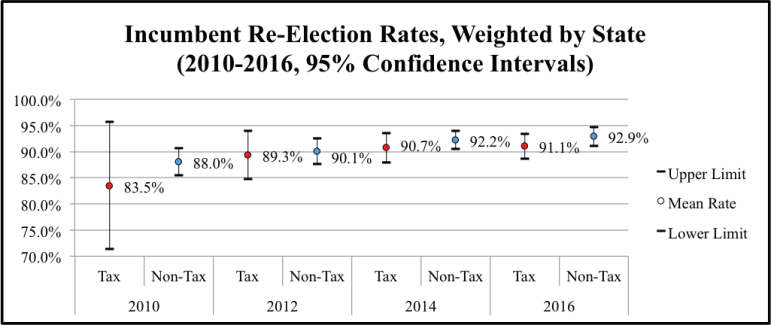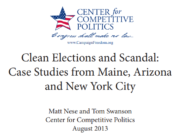The Institute’s tenth issue analysis examines the claim by proponents of taxpayer-funded political campaigns that such systems improve the political process by exposing incumbent politicians to more competition and increasing the chance that challengers will defeat them in elections. If this claim is true, we would expect to find lower incumbent re-election rates in states that offer tax-financed campaigns.
Our results indicate that, despite claims that this policy increases electoral competition, taxpayer financing of political campaigns does not produce statistically significantly lower re-election rates for incumbent state legislators. A comparison between states with and without such laws suggests that the system of funding campaigns has no effect on re-election rates. Many factors contribute to high incumbent re-election rates across states, such as name recognition, the platform provided by elected office, and voter satisfaction with their representatives. Tax-financing of campaigns is not one of those factors.
To study the impact of taxpayer-funded campaigns on competitiveness, we analyze the percentage of incumbents in all state legislatures from 2010 to 2016 that won re-election. We divide the states between those with taxpayer-funded campaign programs for state legislators (Arizona, Connecticut, Hawaii, Maine, and Minnesota) and those without such programs. Incumbent re-election rates were calculated by dividing the number of incumbents who won their primary and general election by the total number of seats up for election, excluding the seats with no incumbent.
Ultimately, on average, incumbents in states with taxpayer-funded campaigns won their primary and general elections at a rate of 88.7% from 2010 to 2016, while those in the other 45 states won at a rate of 90.8% – a difference of just 2.1%. These results pose a problem for advocates of taxpayer-funded campaign systems. If such laws fail to change the composition of legislatures or give challengers a significantly better chance of winning office, they risk spending taxpayer dollars for results that are identical to those in states with privately-funded campaigns. Policymakers should therefore be skeptical of claims that taxpayer-funded campaigns will increase political competition or reduce the overwhelming, built-in advantages that incumbents possess in elections.
https://www.ifs.org/wp-content/uploads/2017/06/2017-06-05_Issue-Analysis-10_Albanese_Do-Taxpayer-Funded-Campaigns-Increase-Political-Competitiveness.pdf














